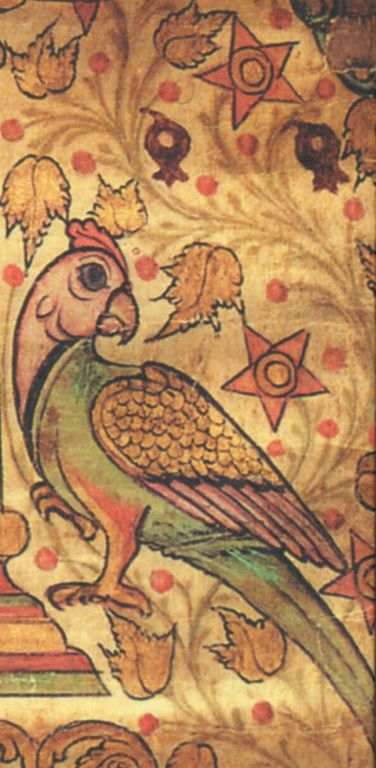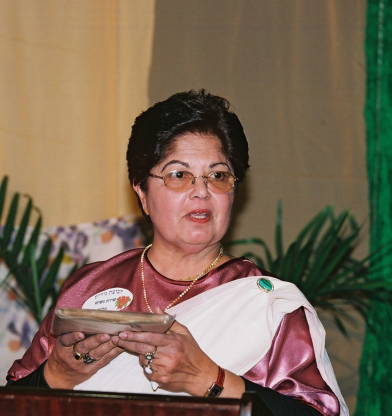2001
71. Our Ancient Hope
Simcha Yosef, Hannah Yitzhak, Rahel Kala, Venus Lane. Recorded at NSA studio, August 19, 2001. CD Track 43; I-24.
Lokaṃ irubhāgaṅṅaḷiluḷḷa jūtaṟ kulajīvan
Daivattoḍuḷḷa āraṃbhikkuṃboḷ siyyona pārikkunnen
1. The living soul of the Jewish People dwells on both sides of the world.
When it revives and turns toward God, Siyon will then be attained.2. Under the Turkish raja, during all those years, (x2)
We ate our food like beggars, ate it like charity. (x2)
Paṇḍu paṟatta nammaḷūḍĕ pāṟappu iniyuṃ kĕṭṭaṭṭille
Nammaḷuḍĕ daivattāl nalkiya nāḍuṅgal iniyuṃ tiriyeṇḍatinu
2. The hope in our hearts since ancient times still has not faded away—
The hope of returning again to our land, the home of David the king.3. As long as our Jewish heart loves our People then we always can hope
That God Who dispersed us because of our sins will grant us His mercy again.4. Brothers and sisters in so many lands, listen to our future song.
As long as the Jews are remaining alive, our hope will always endure.5. Our city Jerusalem, just like the eagle, will be revived and renewed.
The kingdom will live, and it will endure, filled with splendor and praise.6. The House of Jacob again will dwell there through the pure love of God.
And by God’s grace, Mashiya Raja will rule over us as king.[Chorus: Repeat stanza 2]
7. The hope of return that You’ve given to us, may You be pleased to fulfill.
And we beseech You, protect us, the singers—the ones who are singing Your praise.Part II (early 1950s)
8. May David Ben Gurion, our prime minister, govern us, we pray.
And also, we pray for Moshe Sharett to rule together with him.9. And Weizmann, the Zionist so praiseworthy: may Weizmann also be praised.
Never will we forget all the hardships suffered by each one of you.10. O daughter of Siyon, weep no more; your crying has ended now.
May Mashiya be brought and our people united. May Tamburan be praised.11. Ayyo! My Jewish People, wake up! Now all of you can see
That which the Prophet Isaiah foretold; today it has all come to be.12. Even though Doctor Theodore Herzl, the Zionist father, has died,
We ask You please to accept our prayers by the merit of his good deeds.
The original song “Our Ancient Hope” was composed by Isaac Moshe Roby (1876–1955). Nicknamed “Kakicha,” he was a bachelor in the Paradesi community who is remembered as an educated man and popular storyteller. His song can be dated to the early twentieth century because of its contents as well as its appearance in several of the older notebooks. The first four stanzas of “Kakicha’s Song” (as it is titled in two notebooks) closely parallel stanzas 1, 2, 8, and 9 of the original poem “Tikvatenu” (Our Hope), composed in 1877 by European-born Naftali Herz Imber.
Kakicha made a very significant geographical and cultural change in the first stanza of his song. Whereas Imber had written, from a European perspective, of the Jewish soul turning “to the east toward Zion,” the Kerala poet began his song by proclaiming “The soul of the Jewish people dwells on both sides of the world.” He also combined Malayalam and Hebrew words in a manner characteristic of many Kerala Jewish songs, e.g. Yerushalam pattanam (the city of Jerusalem).
The second stanza of the song is indicated in some but not all notebooks as a chorus to be repeated after each stanza, and the song itself is sometimes referred to as “Paṇḍu paṟatta” (Our Ancient Hope)—the first two words of that refrain. In the recording presented here, the singers include the first, second, fifth, and sixth stanzas, repeating the second as a chorus after the sixth.
Despite being found only in notebooks from the three Jewish communities in Kochi, its popularity has spread widely since the aliyah of all eight Kerala communities to Israel, perhaps because of its very catchy melody as well as its Zionist sentiments. Having become something of a staple for Kochini ethnic performances, it was recorded in the 1970s and early 1980s in several moshavim, performed by singers from places other than Kochi. In 2013, it was videorecorded in Israel with instrumental accompaniment by Tova Aharon Castiel, organizer and leader of the Mesillat Zion chorus, whose family was from Parur (http://www.youtube.com/watch?v=36ivkhzq_v0).[1] During that same year, it was performed in Ernakulam in the Carnatic classical style by the noted Kerala vocalist and composer Sreevalsan Menon (http://jewsofcochin.blogspot.com/2013/03/famous-jerusalem-pattanam-song.html).[2]
Part II
A second and quite different version of “Our Ancient Hope” appears in just one notebook from Tekkumbhagam-Ernakulam. It can be dated to the early days of the State of Israel, sometime before the death of President Chaim Weizmann in November 1952. Its first seven stanzas are substantially the same as Kakicha’s, with enough minor changes to indicate that the Ernakulam composer may have learned the song orally rather than from a text. The remaining five stanzas (translated here as part II) reflect a period when the “hope we have had since ancient days” had actually been achieved and most of the Kerala Jews were anticipating aliyah to the new Jewish state. Its focus is praise and support for Zionist leaders: Prime Minister Ben-Gurion, Foreign Affairs Minister Sharett, Weizmann, and the long-deceased Zionist “prophet” Herzl, subject of song 77. We have not found any recording or mention of part II, other than its written text in notebook S-4.
_____________________________
[1] Accessed February 9, 2023.
[2] Accessed February 9, 2023.






